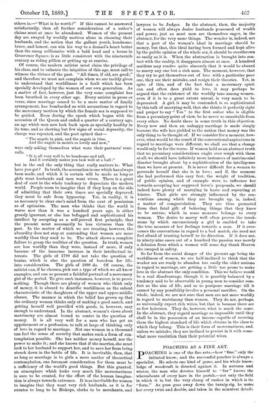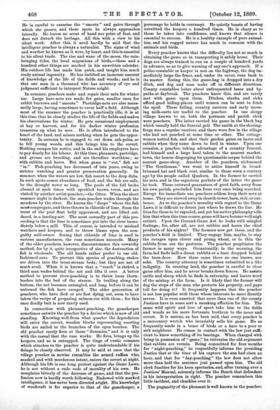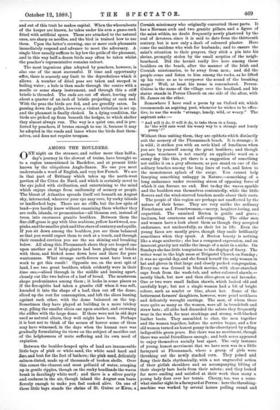POACHING AS A FINE ART.
p0ACHING is one of the fine arts,—how "fine," only the initiated know; and the successful poacher is always a specialist. He selects one kind of game, and his whole know- ledge of woodcraft is directed against it. In autumn and winter, the man who devotes himself to " fur " knows the -whereabouts of every hare in the parish,—not only the field in which it is, but the veryclump of rushes in which is its "form." As puss goes away down the turnip-rig, he notes her every twist and double, and takes in the minutest details
He is careful to examine the " smoots " and gates through which she passes, and these spots he always approaches laterally. He leaves no scent of hand nor print of foot, and does not disturb the herbage. All this with a view to his silent work. After this, it need hardly be said that the intelligent poacher is always a naturalist. The signs of wind and weather he knows, as it were, by heart, and this is essential to his silent trade. The rise and wane of the moon, the rain- bringing tides, the local migrations of birds,—these and a hundred other things are marked in his unwritten calendar. His outdoor life has made him quick, and taught him much ready animal ingenuity. He has imbibed an immense amount of knowledge of the life of the fields and woods; and he is that one man in a thousand who has accuracy of eye and judgment sufficient to interpret Nature aright.
In summer, poachers make and repair their nets for winter use. Large hare-nets are made for gates, smaller ones for rabbit burrows and " smoots." Partridge-nets are also neces- sarily large, having sometimes to cover half a field. Although most of the summer the poacher is practically idle, it is at this time that he closely studies the life of the fields and makes his observations for winter. He gets occasional employment at hay or harvest, and for his darker winter profession treasures up what he sees. He is often introduced to the heart of the land, and misses nothing when he gets the oppor- tunity. In autumn he is engaged to cut down ash-poles, or to fell young woods, and this brings him to the covert Nothing escapes his notice, and in the end his employers have to pay dearly for his labour. At this time, pheasants, partridge, and grouse are breeding, and are therefore worthless ; so with rabbits and hares. But when game is "out," fish are "in." Fish-poaching has decreased of late years, owing to stricter watching and greater preservation generally. In summer, when the waters are low, fish resort to the deep dubs. In such spots comes abundance of food, and the fish are safe, be the drought never so long. The pools of the fell becks abound at such times with speckled brown trout, and are visited by another artist-poacher,—the Otter. When the short summer night is darkest, the man-poacher wades through the meadows by the river. He knows the " deeps " where the fish most congregate, and there throws in chloride of lime. Soon the trout of the pool float belly uppermost, and are lifted out, dazed, in a landing-net. The most cowardly part of this pro- ceeding is that the lime is sometimes put into the river imme- diately below a mill. This, of course, is intended to mislead watchers and keepers, and to throw blame upon the non- guilty mill-owner. Seeing that chloride of lime is used in various manufactures, the ruse sometimes succeeds. Many of the older poachers, however, discountenance this cowardly method, for by it, quite irrespective of size, the destruction of fish is wholesale. The old hands rather prefer to use old- fashioned nets. To prevent this species of poaching, stakes are driven into the trout-stream beds ; but they are not of much avail. When it is known that a "reach" is staked, a third man wades behind the net and lifts it over. A better method to prevent river-poaching is to throw loose thorn- bushes into the bed of the stream. In trailing along the bottom, the net becomes entangled, and long before it can be unloosed the fish have escaped. The older generation of poachers, who have died or are fast dying out, seem to have taken the recipe of preparing salmon-roe with them ; for this once deadly bait. is now rarely used.
In connection with pheasant-poaching, the gamekeeper sometimes outwits the poacher by a device which is now of old standing. Knowing well from what quarter the depredators will enter the covert, wooden blocks representing roosting birds are nailed to the branches of the open beeches. The old poacher rarely fires at these "dummies," and it is only with the casual that the ruse works. He fires, brings up the keepers, and so is entrapped. The tinge of rustic romance which attaches to the poacher is quite understandable if his doings be closely observed. It may be said at once that the village poacher in nowise resembles the armed ruffian who, masked and with murderous intent, enters the covert at night. Although his life is one long protest against the Game Laws, he is not without a rude code of morality of his own. He complains bitterly of the decrease of game, and that the pro- fession now is hardly worth following. Endowed with marked intelligence, it has never been directed aright. His knowledge of woodcraft is far superior to that of the gamekeeper, a personage he holds in contempt. He quietly boasts of having outwitted the keepers a hundred times. He is chary as to those he takes into confidence, and knows that silence is essential to success. He is a healthy example of pure sminnR1- ism, and his rugged nature has much in common with the animals and birds.
Every poacher knows that the difficulty lies not so much in obtaining the game as in transporting it safely home. Their dogs are always trained to run on a couple of hundred yards in advance, so as to give warning of anyone's approach. If a police-constable or keeper is met on the highway, the dog im- mediately leaps the fence, and, under its cover, runs back to its master. Seeing this, the game-bag is dropped into a dry ditch, and dog and man make off in different directions. County constables loiter about unfrequented lanes and by- paths at daybreak. The poachers know this, and are rarely met with game upon them. Ditches, stacks, and ricks afford good hiding-places until women can be sent to fetch the spoil. These failing, country carriers and early morn- ing milk-carts are useful to the poacher. In one sleepy village known to us, both the postman and parish clerk were poachers. The latter carried his game in the black bag which usually held the funeral pall. The smith at the shoeing- forge was a regular receiver, and there were few in the village who had not poached at some time or other. The cottage- women netted fish, and shut their garden gates on hares and rabbits when they came down to feed in winter. Upon one occasion, a poacher, taking advantage of a country funeral, had himself and a large haul taken to the nearest market- town, the hearse disgorging its questionable corpse behind the nearest game-shop. Another of the poachers, nicknamed "The Gentleman," was wont to attire himself in broad- brimmed hat and black coat, similar to those worn a century ago by the people called Quakers. In the former he carried his nets, and in the capacious pockets of the latter the game he took. These outward guarantees of good faith, away from his own parish, precluded him from ever once being searched. Except for immediate use, poachers seldom keep their nets at home. They are stowed away in church-tower, barn, rick, or out- house. As to the poacher's morality with regard to the Game Laws, it is difficult to detect just where he draws the line. He lives for these to be repealed, and yet his native philosophy tells him that when this time comes, game will have become well-nigh extinct. Upon the Ground-Game Act he looks with mingled feelings ; for, after all, are not rabbits and hares the chief products of his nights P The farmers now get these, and the poacher's field is limited. They engage him, maybe, to stay the ravages upon clover and young wheat, or to thin the rabbits from out the pastures. The poacher propitiates the farmer in many ways. Occasionally, in the morning, the farm-lad finds half-a-dozen rabbits or a hare dropped behind the barn-door. How these came there no one knows, nor asks. The country attorney is sometimes submitted to a like indignity. In crossing land, the poacher is careful to close gates after him, and he never breaks down fences. He assists cattle and sheep which he finds in extremity, and leaves word of the mishap at the farm. Is it likely that the farmer will dog the steps of the man who protects his property, and pays toll for doing it P It frequently happens that the poacher is not leas popular with those whose interests he more directly serves. It is even asserted that more than one of the county Justices have in some sort a sneaking affection for him. The same wild spirit and love of sport take him to the fields and woods as his more fortunate brethren to the moor and covert. It is untrue, as has been said, that every poacher is a mercenary wretch who invariably sells his game. He as frequently sends in a brace of birds or a hare to a poor or sick neighbour. He comes in contact with the law just suffi- cient to know something of its bearings. When charged with being in possession of "game," he reiterates the old argument that rabbits are vermin. Being committed for four months for "night-poaching," he respectfully informs the presiding Justice that at the time of his capture the sun had risen an hour, and that for "day-poaching" the law does not allow more than half the sentence just passed upon him. The old clerk fumbles for his horn spectacles, and, after turning over a Justices' Manual, solemnly informs the Bench that defendant in his interpretation is right. The poacher remembers this little incident, and chuckles over it.
The pugnacity of the pheasant is well known to the poacher,
and out of this trait he makes capital. When the whereabouts -of the keeper are known, he takes under his arm a game-cock fitted with artificial spurs. These are attached to the natural -ones, are sharp as needles, and the bird is trained how to use them. Upon the latter's crowing, one or more cock-pheasants immediately respond and advance to meet the adversary. A single blow usually suffices to lay low the pride of the pheasant, and in this way half-a-dozen birds may often be taken whilst the poacher's representative remains unhurt.
The most ingenious plan adopted by poachers, however, is also one of the most sue,cessful. If time and opportunity -offer, there is scarcely any limit to the depredations which it allows. A number of dried peas are taken and steeped in boiling water; a hole is then made through the centre with a -needle or some sharp instrument, and through this a stiff bristle is threaded. The ends are cut off short, leaving only about a quarter of an inch of bristle projecting at each end. With the peas the birds are fed, and are greedily eaten. In passing down the gullet, however, a violent irritation is Bet up, and the pheasant is finally choked. In a dying condition, the birds are picked up from beneath the hedges, to which shelter they almost always run. The way is a quiet one, and is pre- ferred by poachers, if brutes enough to use it, because it may he adopted in the roads and lanes where the birds dust them- selves, and does not require trespass.




















































 Previous page
Previous page